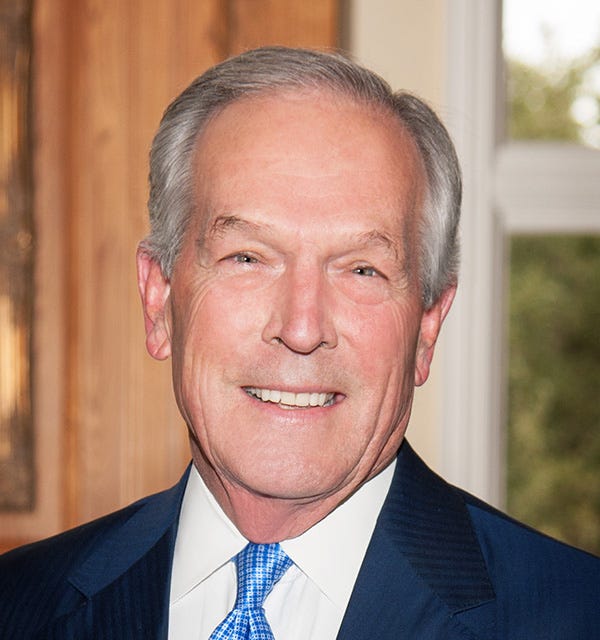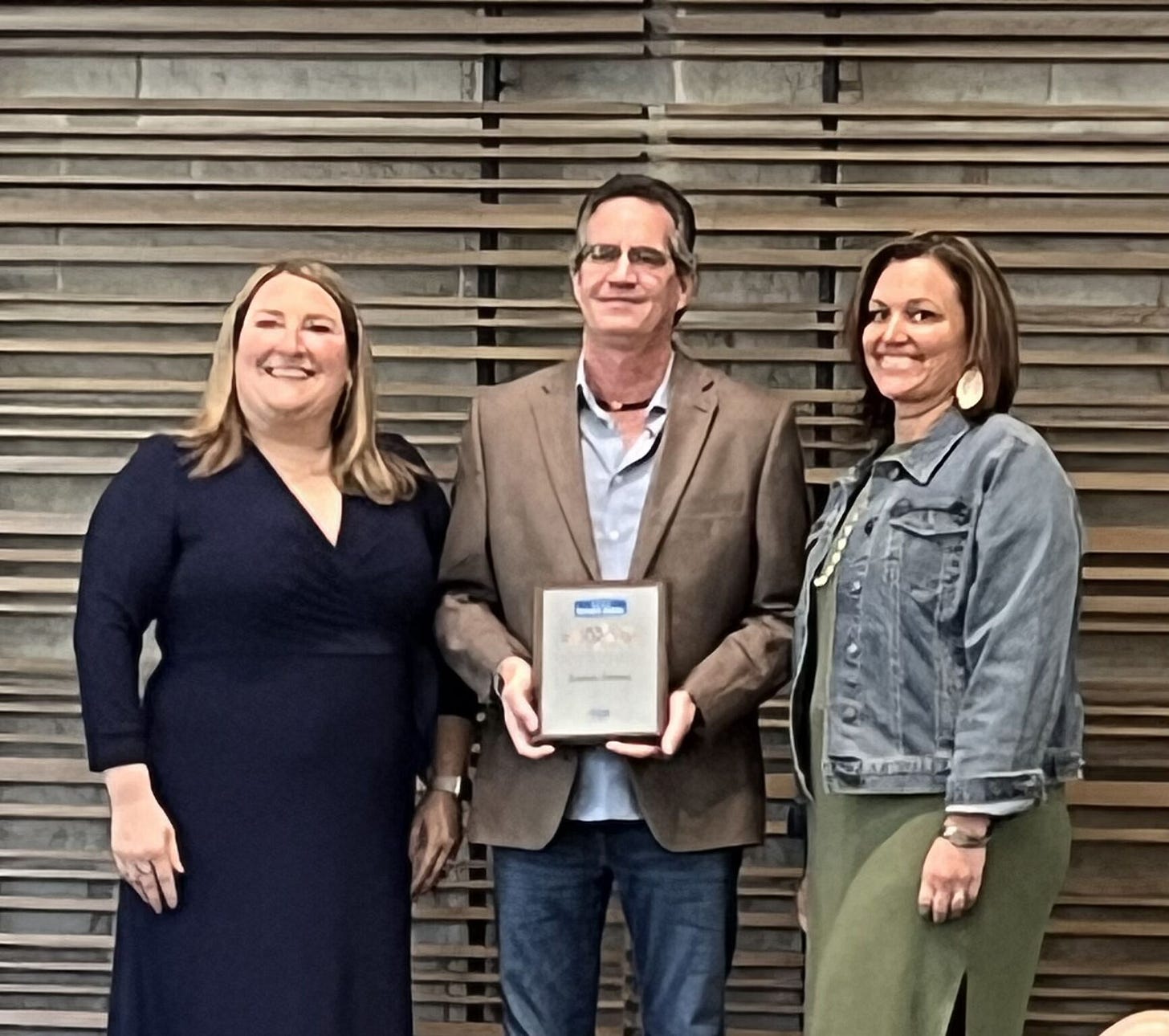Here are the special guests, energy experts and community leaders for This Week In Energy April 26:
Former U.S. Secretary of Commerce and Founding Chairman of the Permian Strategic Partnership, Don Evans shares his insights on leadership, regional collaboration, and what’s ahead for the future of the Permian Basin — a region that continues to power America’s energy and economic strength. Interview by Krista Escamilla
is a prominent American businessman and public servant. He earned a B.S. in mechanical engineering in 1969 and an M.B.A. in 1973 from the University of Texas at Austin. During his college years, he worked in a Texas steel mill and was active in organizations such as Sigma Alpha Epsilon and Omicron Delta Kappa.
In 1975, Evans moved to Midland, Texas, and began working as a "roughneck" on oil rigs for Tom Brown, Inc., a large independent energy company. He rose through the ranks and became CEO in 1985, a position he held until 2001.
A close friend and advisor to George W. Bush, Evans played significant roles in Bush's political career, including chairing his successful Texas gubernatorial campaigns in 1994 and 1998, and serving as chairman of the 2000 Bush-Cheney Presidential Campaign. In 1995, he was appointed to the University of Texas Board of Regents, serving as chairman from 1997 to 2001.
Evans served as the 34th U.S. Secretary of Commerce from 2001 to 2005 under President George W. Bush. In this role, he advocated for the free-enterprise system, free and fair trade agreements, and responsible corporate stewardship. He worked closely with President Bush to reduce taxes, open markets for American goods and services, and promote a level playing field abroad.
After leaving the Commerce Department, Evans continued his involvement in the energy sector and public service. From 2007 to 2018, he served as Chairman of Energy Future Holdings Company, formerly TXU Energy. He also served as CEO of the Financial Services Forum, a trade association representing the CEOs of financial services firms.
Evans is the founding chairman of the Permian Strategic Partnership (PSP), a coalition of energy companies focused on improving infrastructure, education, healthcare, and workforce development in the Permian Basin. He took on this role after being approached by CEOs of the partnership's member companies.
In addition to his role at PSP, Evans serves as Chairman of the George W. Bush Foundation and as a senior advisor at Energy Capital Partners. He is also involved in various community and philanthropic activities, including serving on the Midland Memorial Hospital Board of Governors.
Evans resides in Midland, Texas, with his wife, Penelope Slade Evans. They have six children and seven grandchildren.
Krista Escamilla is as an Associated Press Award winning journalist for CBS7 News, Krista woke West Texans up each weekday morning for ten years with the latest news and weather.
in 2010, Krista was recognized for fair and balanced reporting by the Midland Independent School District and honored by the state of Texas as a member of the Media Honor Roll.
She serves the community as an emcee for many non-profit groups and is a public speaker who loves to help others achieve their dreams.
Krista’s strengths in business are utilizing her 25 years experience in broadcasting by mentoring and helping others promote their companies.
Click here for The Krista Escamilla Show
Tom Shepstone, energy editorialist and publisher of Energy Security Freedom, says NGOs Are "The Biggest Scam Ever" and explains how they have impacted the energy industry while changing the climate conversation.
Day One has gotten most of its money from government grants. So have Active SGV and the Council for Watershed Health. Treepeople gets about half of its money from taxpayers, and Grid Alternatives gets roughly 10% from the same source. Each has very well-paid staff and more than one hires consultants.
This is how the scam works. The money is filtered down through a series of NGOs, each of which takes its cut for administration to pay the well-paid staff. All for the supposed purpose of “climate and public health and enhancement.”
Click here for Tom Shepstone’s Energy Security Freedom Substack Page
Dave Roberts, host of the Volts Podcast,, and Val Miftakhov of ZeroAvia, argue that hydrogen fuel cells paired with electric motors are the key to decarbonizing aviation. They discuss why Miftakhov prefers a solution of sustainable aviation fuels or batteries, the challenges and misconceptions around supplying and refueling with hydrogen, and the tech roadmap from today's small retrofits to tomorrow's large jets.
David Roberts
So, as I understand it, the "engine" — I'm using, for the purposes of this pod, all uses of the term engine should be heard in air quotes — so your engine consists of three parts, basically: you've got hydrogen storage of some kind, you've got hydrogen fuel cells that use the hydrogen to create electricity, and then you've got electric motors. So let's start with the fuel cell, because, you know, as I was thinking about this, I suspect most people, even a lot of energy-inclined people, don't really have a great sense of what fuel cells are.
So could you just explain quickly how a fuel cell creates electricity?
Val Miftakhov
Absolutely. And by the way, the confusion goes both from the general public, but also from the aviation folks sometimes as well, because in the standard aviation terminology, a fuel cell is where you put fuel in the aircraft. So we've got a lot of those as well. But overall, a fuel cell is an electrochemical device that takes some chemical, energetic chemical, like hydrogen, but there are other types of fuel cells out there, and oxygen typically from the air and converts that in an electrochemical device into electricity. Point of note, there is that there is no, as you said, combustion or there are no moving parts associated with it.
So, it's really looking more like a battery with a number of cells arranged in a stack, and then you get a fuel cell stack that produces a large amount of electricity at relatively high voltage. So, similar to a battery pack. But of course, you know, with the fuel cells and especially with hydrogen fuel cells at the system level, you get much, much higher energy density or specific energy in terms of the amount of energy per unit of weight of the system.
David Roberts
Well, I want to return to that in a second. So, just on a kind of first principles basis, why fuel cells instead of SAF? Why fuel cells instead of combusting synthetic fuels? What's the advantage?
Val Miftakhov
Yeah, very good question. And the advantage comes from two sides. One is on the impact of why we're doing this altogether. Why do we care about moving to sustainable fuels or moving to new aviation? We're talking about a couple of things there. One is pollution, of course, which has multiple elements, so carbon is one. But there is also non-carbon effects on climate and on health. There are a lot of studies that put, without any doubt, adverse health effects around the airports because of the particulate emissions, because of the high NOx output, nitrogen oxides from the combustion from those engines.
And, in order to get away from all of that, you really need to get away from combustion. So, as long as you're burning fuel, you're still having all of those negative effects. So, you can burn zero carbon fuel, you still have those effects.
David Roberts
You still have the particulates and the NOx and other kinds of air pollution.
Val Miftakhov
That's right. And you know, there are other negative self-combustion of course, because you have high temperatures and pressures, your materials are stressed and as a result, your maintenance costs are higher. But those are sort of softer effects. The hard reason, at least for us at ZeroAvia and similar pioneers out there and people who support us like Breakthrough Energy Ventures, you know, Amazon Climate Pledge funds, people who really try to force the transition of hard to abate sectors, these combustion effects are really, really important. So that's one aspect of things. The second aspect is that sustainable aviation fuels that are based on synthetic hydrogen production and carbon capture, as you mentioned in the beginning, those are fundamentally much more expensive than hydrogen fuel cell propulsion because you can use with hydrogen fuel cells, you can already use that green hydrogen that you produced without going through carbon capture without going through the chemical plants architecture that combines that hydrogen with carbon and produces liquid fuels.
You can use hydrogen directly in the fuel cell system, and you can use it more efficiently because the fuel cells, the current generation of fuel cells, already are 60% or so efficient. And the best combustion engine we have for aircraft, the largest engines that we have, are about 50% efficient. But the vast majority of the engines on the smaller aircraft, under 100 seats, are less than 30% efficient. So, you have double the efficiency. You don't need any of the carbon capture or any of the chemical process beyond it. So, economics becomes much, much better. So, these two factors, we think, undoubtedly, to us at least, point to hydrogen fuel cells as the eventual solution to this problem.
Click here for the Volts Podcast
Warren Martin, Kansas Strong: The KS Oil & Gas Resources Fund recaps KIOGA, discusses changing the energy conversation and a couple upcoming projects with a new PBS Series Turning Point with Dennis Quaid and some work with Glenn Beck on activating energy enthusiasts.
“The Kansas Independent Oil and Gas Association represents predominantly the western side of Kansas where you have deeper wells,” Marin said. “You don't have as much water flood as you do on the eastern side of the state. But we had a really good conversations.”
Martin continued his update from KIOGA folding in a few issues facing the state’s producers.
“What we're talking about with the price of oil being as low as it is, with the impacts that are coming from the changing of our funding system under the Trump administration that's really impacting marginal wells,” Martin said. “And marginal wells are a significant part of the oil and gas industry. And we have a lot of marginal wells here in Kansas.”
"Marginal Wells” (Stripper Wells) were also discussed in detail.
“And so marginal wells account for 15% of overall oil production in the United States,” Martin said. “And if you take that 15% of oil production offline, we're no longer the leading producer of oil in the world.”
With nearly 3,000 members, KIOGA is the lead state & national advocate for Kansas independent oil & natural gas producers. KIOGA is committed to ensuring that tomorrow’s energy policy will be one in which our members grow & prosper.
Their active presence before the Kansas Legislature, U.S. Congress, state & federal regulatory agencies, & other governmental decision-makers means the concerns of Kansas independent oil & natural gas producers are heard in Topeka & Washington.
Martin next explained the strategy behind their latest marketing campaign with political pundit Glenn Beck.
“We chose him because he has a strong following in that following, he has the tendency to be able to activate that following,” Martin said. “It's not a general broadcast for us. It's really geared towards the more conservative audience in the State of Kansas, with the goal of activating them, getting them to go to our website.”
Glenn Beck is a leading American media personality, political commentator, author, and founder of TheBlaze. He hosted "The Glenn Beck Program," which aired on CNN Headline News and later on Fox News Channel, showcasing his insights on American culture and politics.
“I've watched and listened to him for years as I do all kinds of media all over the place, and one of the things I've noticed is that he has a very loyal, strong following, and he can activate his audience to respond,” Martin said. “His audience responded to what happened in Israel. His audience responded to what happened in North Carolina with the hurricane. His audience has responded to so many things in very amazing ways.”
The Blaze network continues to feature Beck's commentary through live radio broadcasts and podcasts, offering storytelling and perspectives on current events. Additionally, TheBlaze TV provides a platform for Beck's views and discussions, aiming to engage audiences with candid opinions and analysis.
For more information on Kansas Strong, click here
Joe Sinnott, CEO, Witting Partners LLC and the host of The Energy Detox Podcast explains The 50-50-50 Energy Corps vision announced by EQT Corporation’s Toby Z. Rice and Switch Energy Alliance’s Dr. Scott W. Tinker, PhD last month at CERAWeek—50 MWh and $50K GDP per capita within 50 years to lift people out of energy poverty and help them thrive.
Key Components of the 50-50-50 Vision
50% Emissions Reduction: Targeting a 50% cut in global emissions by replacing coal with cleaner energy sources, particularly U.S. liquefied natural gas (LNG).
50% Energy Access: Striving to provide reliable and affordable energy to 50% of the global population currently lacking access, thereby reducing energy poverty.
50 Years of Sustainability: Ensuring that the energy solutions implemented are sustainable and effective over the next 50 years, balancing environmental and economic considerations.
Strategic Emphasis
Natural Gas as a Transition Fuel: Rice emphasized the role of U.S. shale gas in displacing coal, noting that increasing LNG exports could significantly reduce global emissions.
Infrastructure Development: Highlighting the need for expanded energy infrastructure, such as pipelines and LNG facilities, to facilitate the global distribution of natural gas.
Integration with Renewable Energy: Dr. Tinker advocated for a balanced energy mix, combining natural gas with renewable sources like wind and solar to achieve reliability and sustainability.
Collaborative Approach
The initiative calls for collaboration among industry leaders, policymakers, and communities to implement practical solutions that address both energy security and climate goals.
The 50-50-50 Energy Corps vision represents a comprehensive strategy to transition towards a more sustainable and equitable global energy landscape.
This Week In Energy will air across 22 radio stations this weekend and drop on podcast Saturday morning.
This Week In Energy is a weekly newsmagazine radio podcast which qualifies for FCC mandated Public Affairs time. This Week In Energy addresses issues of public interest, such as safety, education, poverty, environment, mental health, and/or employment. Published files and recordings of interviews available as public files to increase accessibility to the public and to ensure the security of information.
All Energy Has A Purpose And We Are All Energy!
Singer Songwriter music feature is the Blind Joe. Click here for their website and music.
Everyday your story is being told by someone. Who is telling your story? Who are you telling your story to?
Email your sustainable story ideas, professional press releases or podcast submissions to thecontentcreationstudios(AT)gmail(DOT)com
CLICK HERE FOR SPECIAL PARAMOUNT + DISCOUNT LINK
Paramount+ offers its subscribers a plethora of quality content.
From instant classic films to banger TV shows like 1883 and Smile 2, there’s no shortage of entertainment to explore.
How about the new series Happy Face? It’s getting fabulous reviews.
Start Streaming Today!



























Share this post